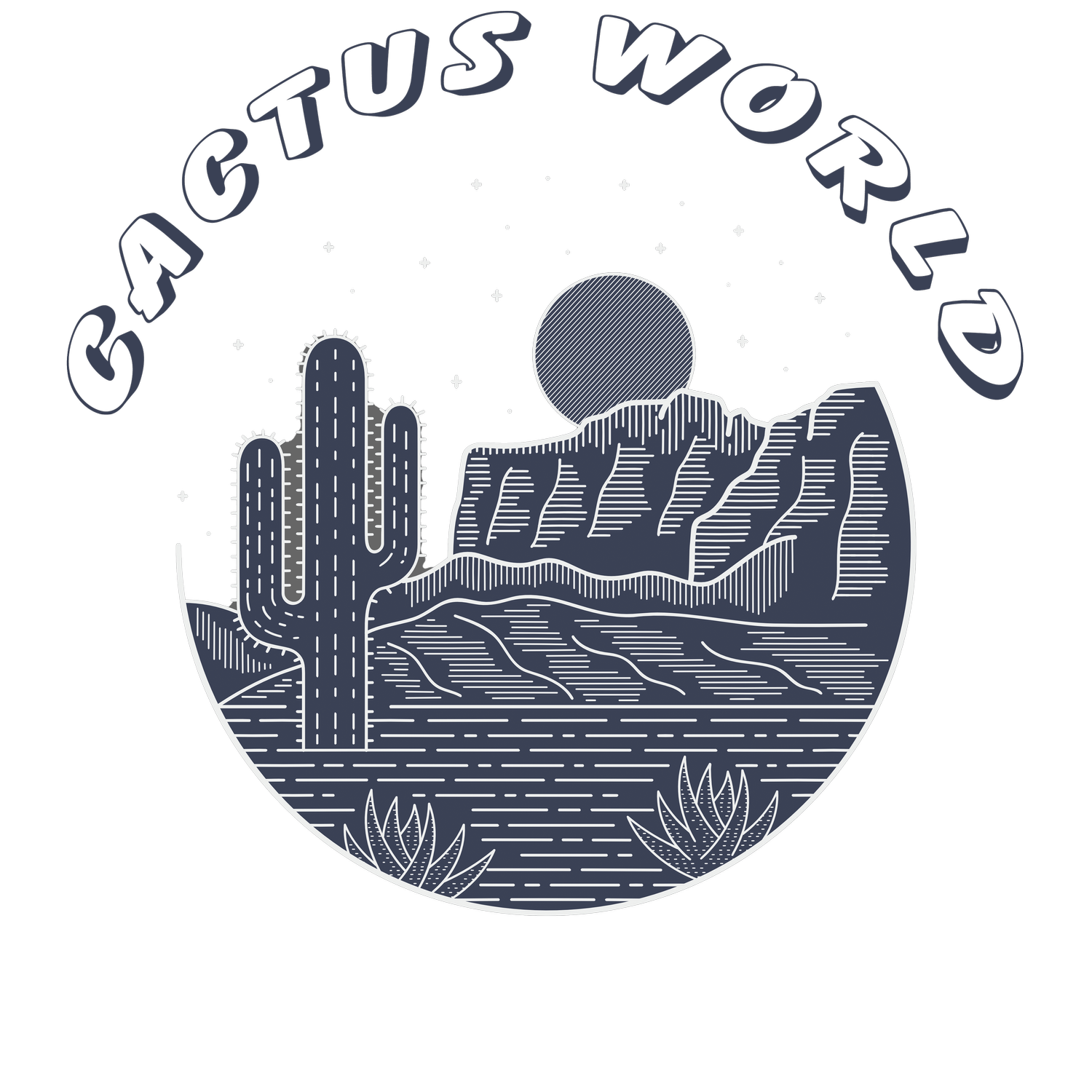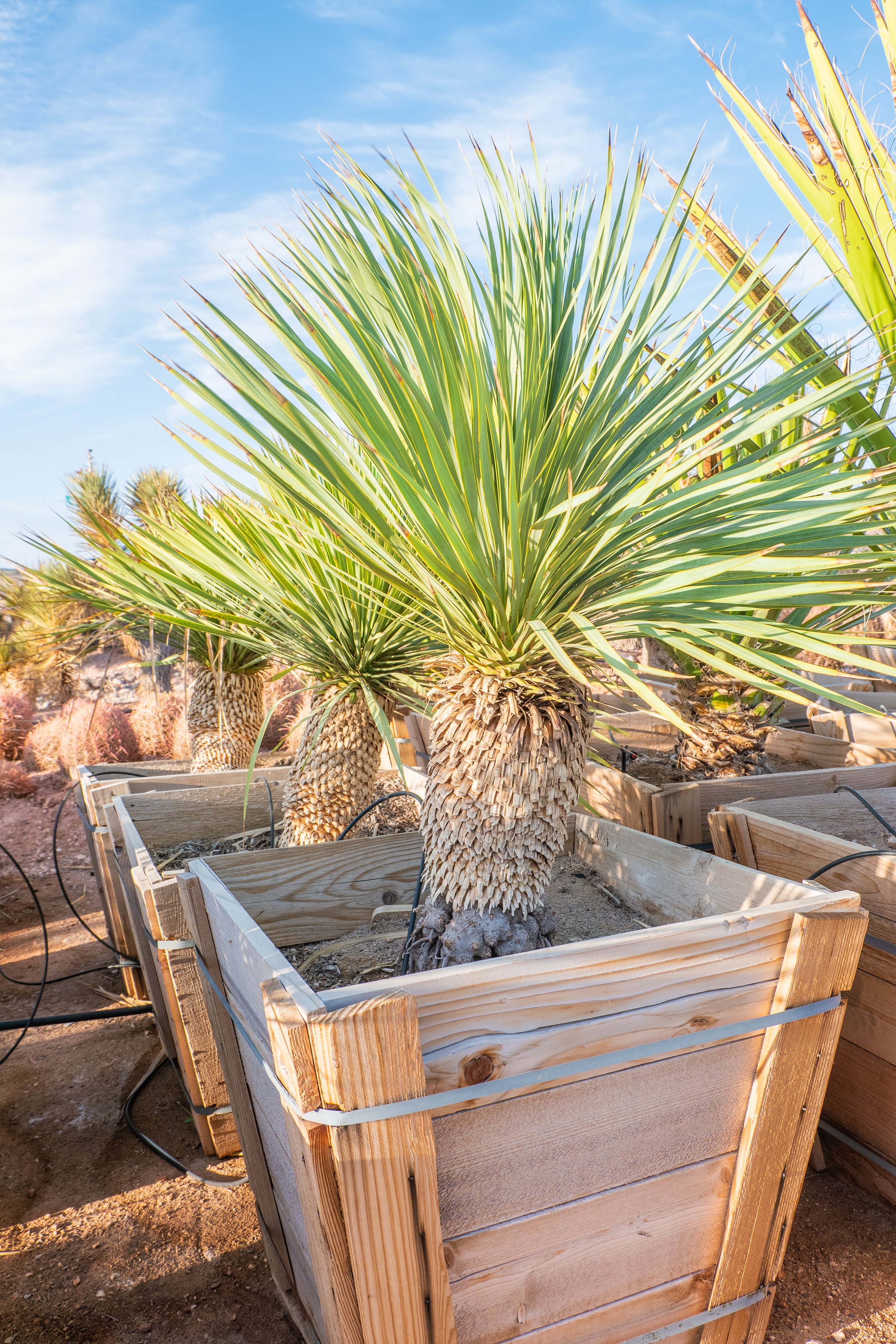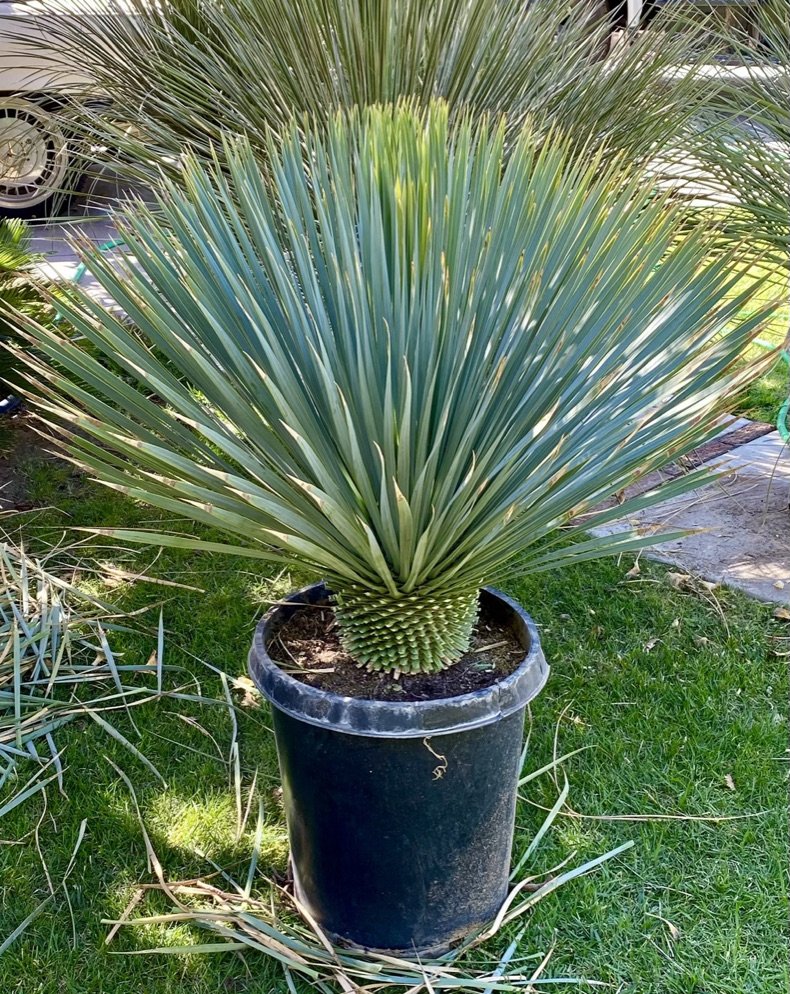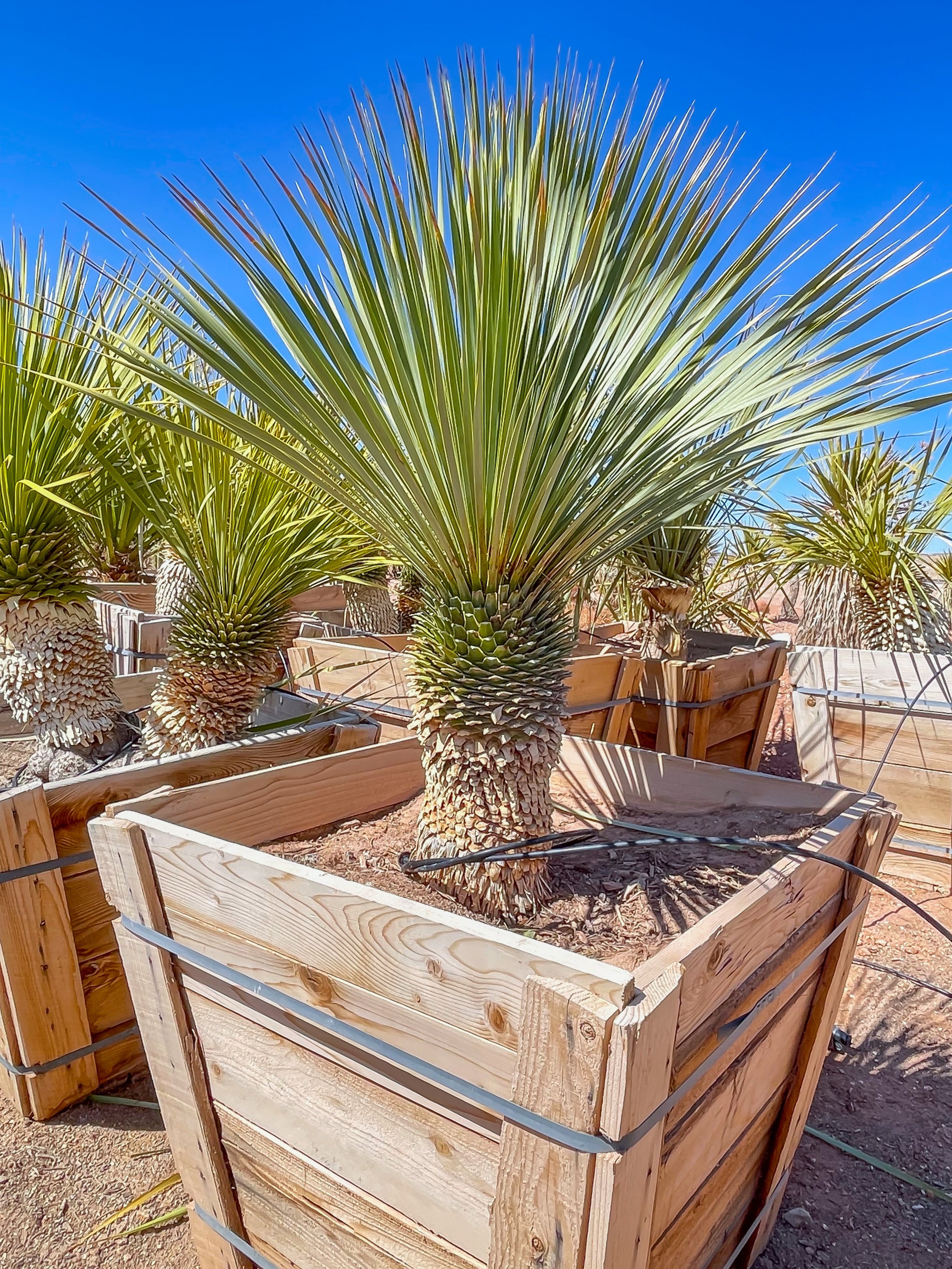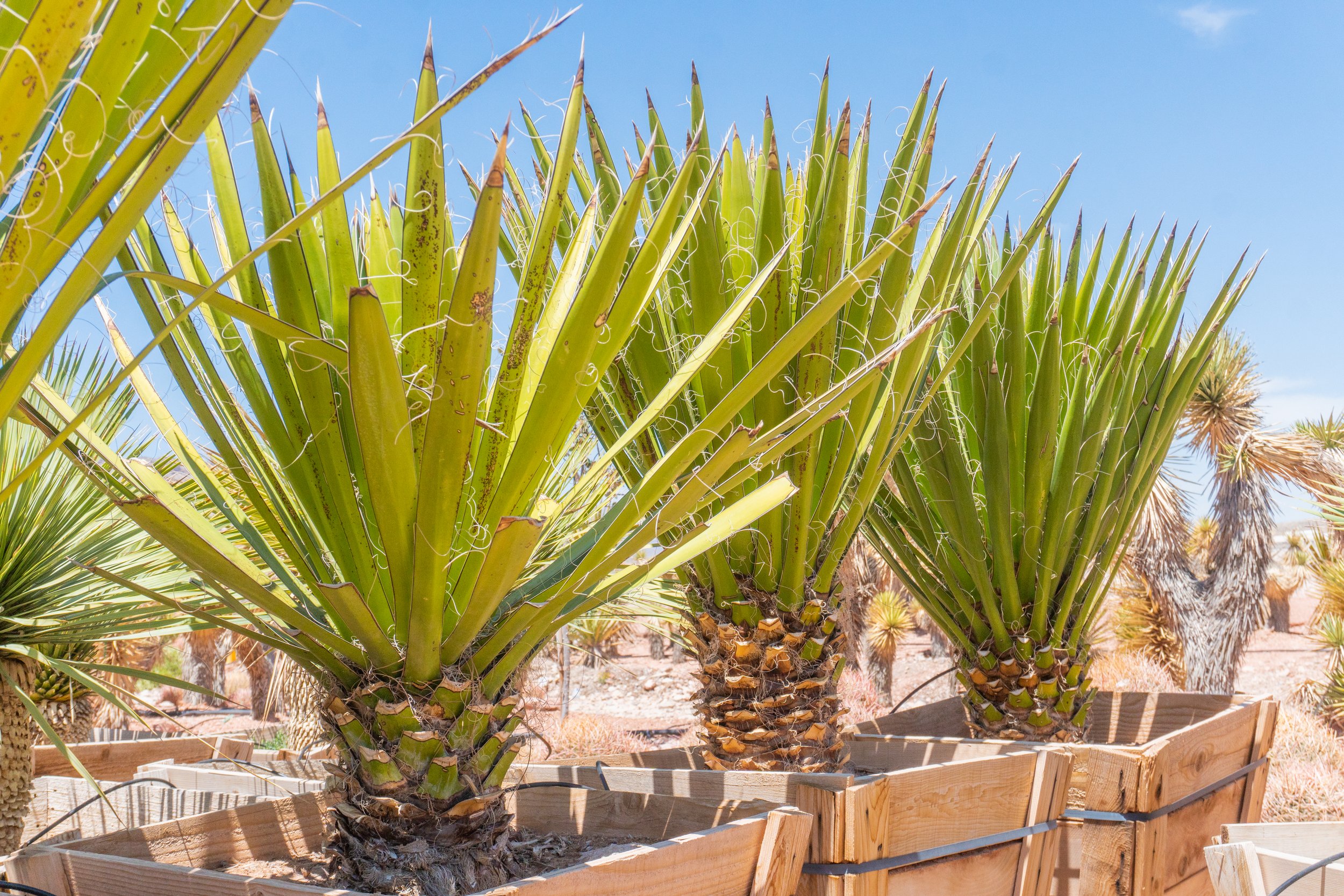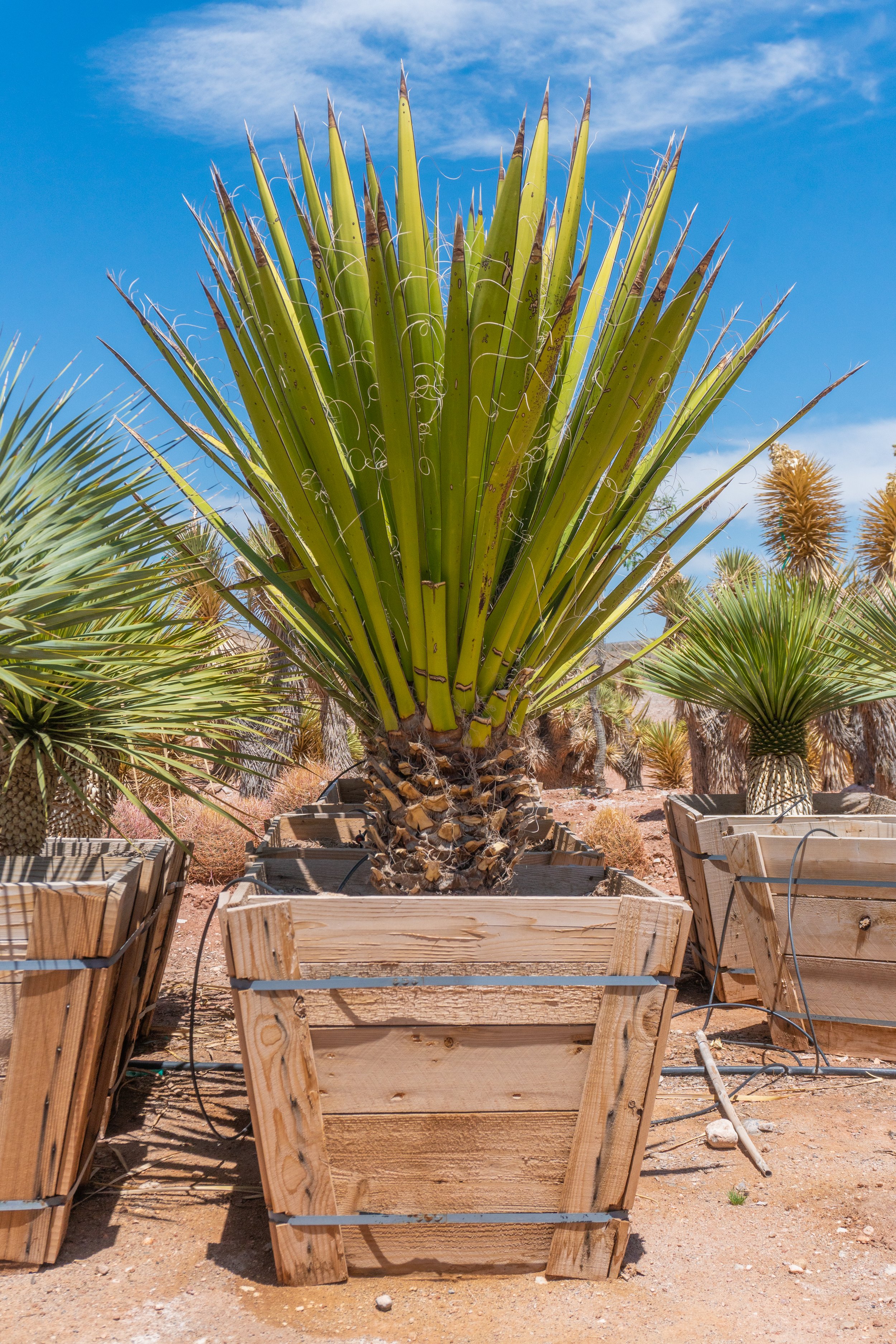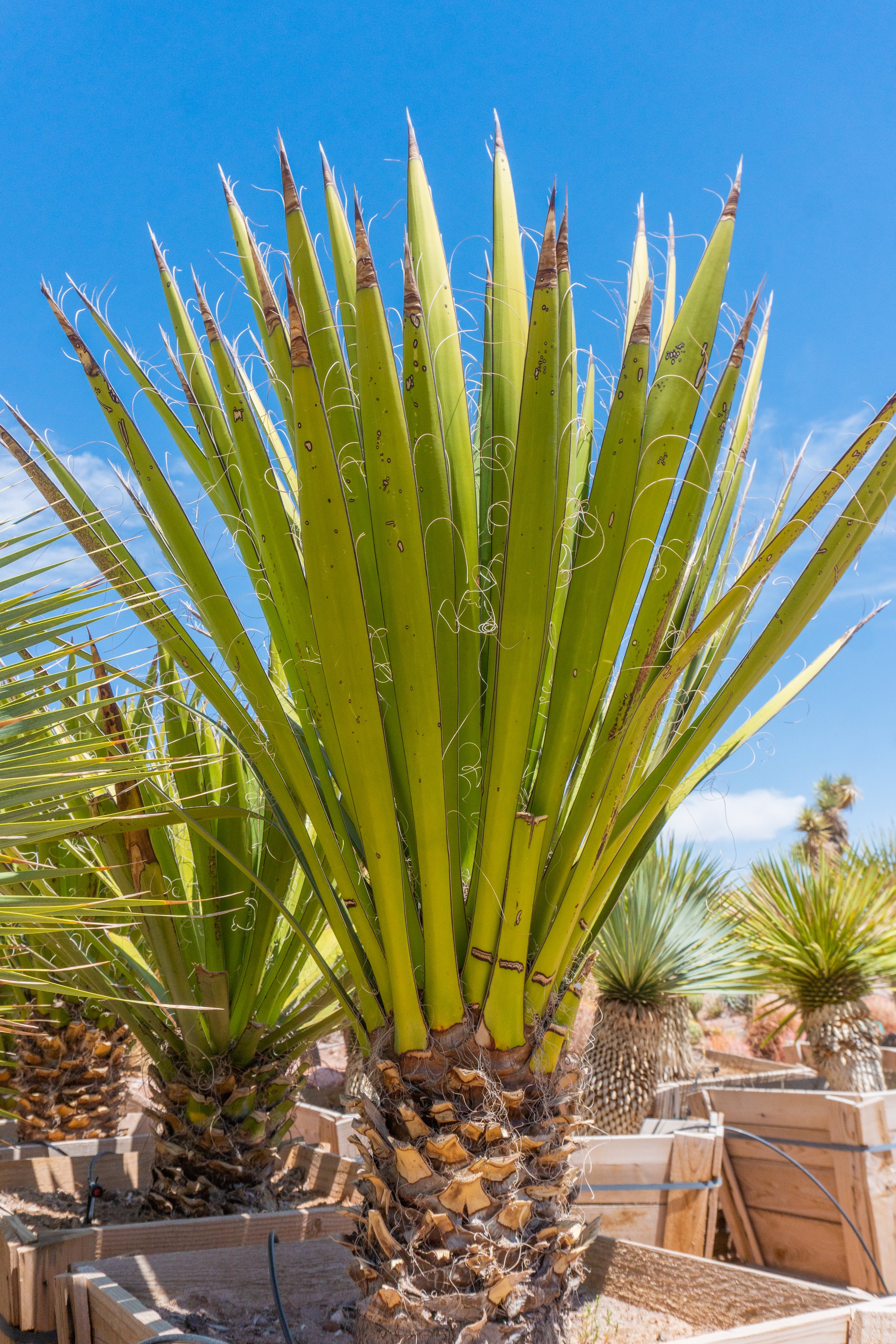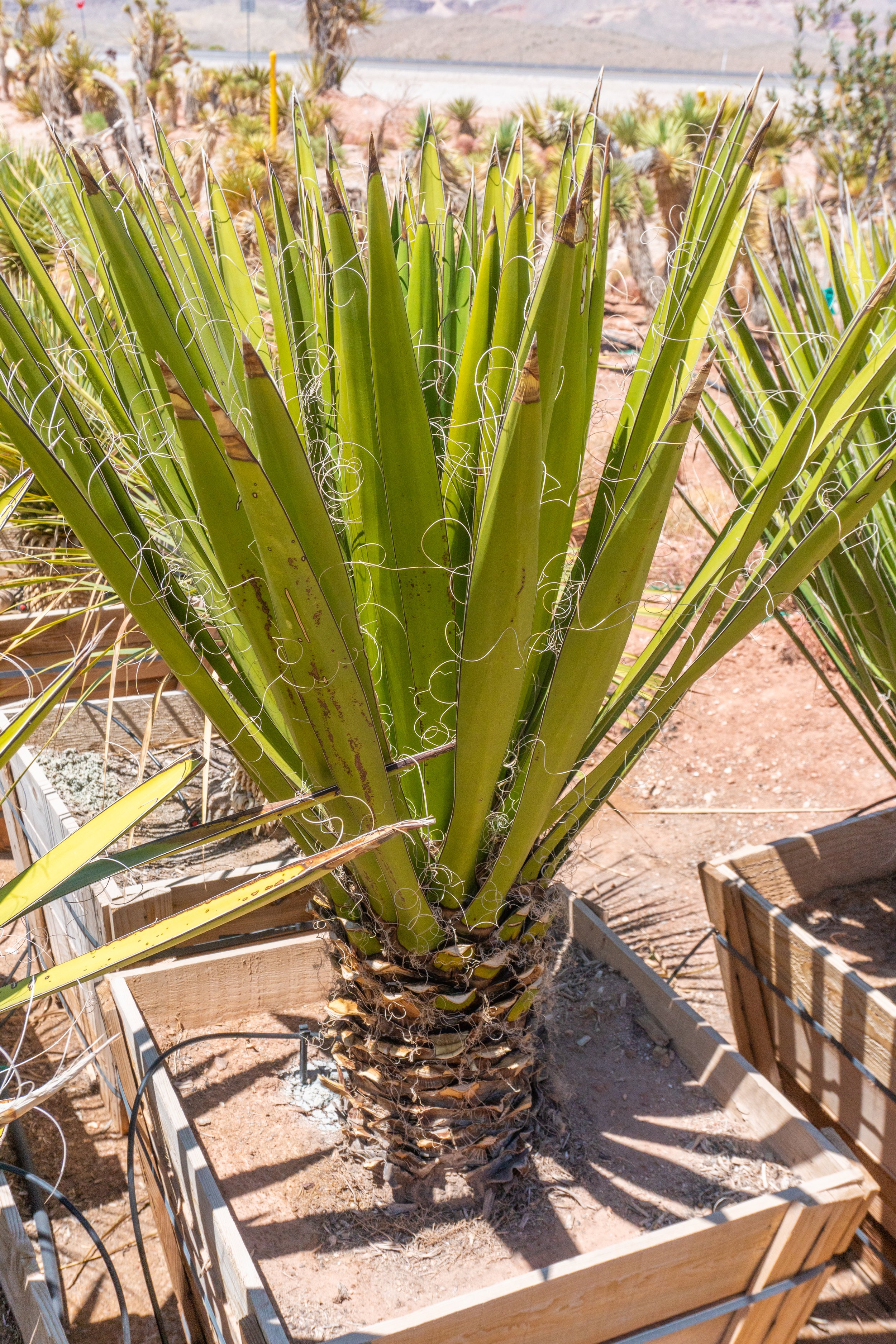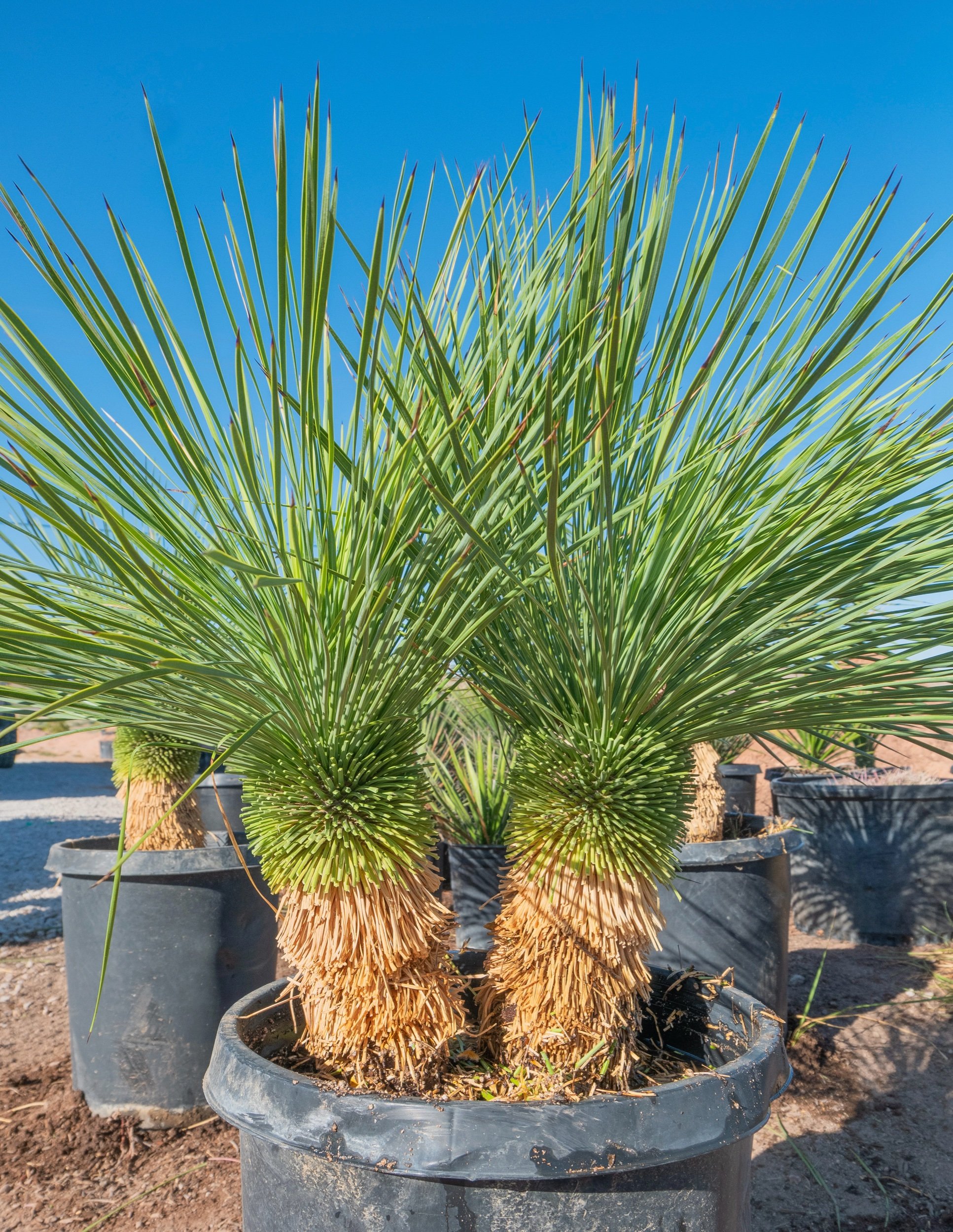Yucca Rostrata
Yucca rostrata, also known as Beaked Yucca or Big Bend Yucca, is a stunning and resilient succulent native to the Chihuahuan Desert in northern Mexico and southwestern Texas. Here's a detailed overview of its characteristics and care requirements:
Characteristics: Yucca rostrata is characterized by its striking, architectural form and dramatic foliage. It typically forms a single trunk with dense clusters of narrow, stiff leaves arranged in a rosette at the top. The leaves are blue-gray to silver-green in color, with sharp tips and a distinctive spiral pattern. In mature specimens, Yucca rostrata can reach heights of up to 10 feet or more, with the foliage forming a spherical crown atop the trunk.
Cold Hardiness: Yucca rostrata is highly cold hardy and can tolerate temperatures as low as -20°F (-29°C) when provided with proper protection from frost and freezing temperatures. It is generally hardy to USDA hardiness zones 5b to 10b.
Soil and Water Preferences: This yucca thrives in well-draining soil with excellent drainage. A mix of sandy or gravelly soil with organic matter works well. Yucca rostrata is drought-tolerant once established and prefers infrequent but deep watering. Water sparingly, allowing the soil to dry out between waterings to prevent root rot.
Sunlight Needs: Yucca rostrata prefers full sunlight and thrives in hot, dry conditions. Provide it with at least 6 to 8 hours of direct sunlight per day for optimal growth and health. However, it can also tolerate partial shade, especially in hotter climates, but may not grow as vigorously or flower as prolifically in shaded areas.
How to Take Care of it:
Watering: Water sparingly, allowing the soil to dry out between waterings. Deep watering every few weeks during periods of prolonged dryness can help maintain the health and vigor of the plant.
Sunlight: Place in a location that receives plenty of sunlight, ensuring that the plant receives at least 6 to 8 hours of direct sunlight per day.
Temperature: Yucca rostrata is highly cold hardy, but providing winter protection, such as covering with frost cloth or mulching around the base of the plant, can help protect it from extreme cold temperatures and frost damage.
Soil: Ensure the soil is well-draining to prevent waterlogged conditions, which can lead to root rot.
Fertilizing: Apply a balanced fertilizer sparingly during the growing season (spring and summer) to promote healthy growth, following the manufacturer's instructions.
With proper care and attention to its needs, Yucca rostrata will reward you with its striking form, dramatic foliage, and resilience in arid landscapes.
*SIZING : PLANT IS MEASURED FROM TOP OF ROOT BALL TO THE TALLEST POINT OF THE LEAVES (OVERALL HEIGHT)
*PHOTOS ARE EXAMPLES OF PLANT, THE ONE YOU WILL RECEIVE WILL DIFFER SLIGHTLY
SHIPPED BARE ROOT / PLEASE CHECK LOCAL SHIPPING RESTRICTIONS
Yucca rostrata, also known as Beaked Yucca or Big Bend Yucca, is a stunning and resilient succulent native to the Chihuahuan Desert in northern Mexico and southwestern Texas. Here's a detailed overview of its characteristics and care requirements:
Characteristics: Yucca rostrata is characterized by its striking, architectural form and dramatic foliage. It typically forms a single trunk with dense clusters of narrow, stiff leaves arranged in a rosette at the top. The leaves are blue-gray to silver-green in color, with sharp tips and a distinctive spiral pattern. In mature specimens, Yucca rostrata can reach heights of up to 10 feet or more, with the foliage forming a spherical crown atop the trunk.
Cold Hardiness: Yucca rostrata is highly cold hardy and can tolerate temperatures as low as -20°F (-29°C) when provided with proper protection from frost and freezing temperatures. It is generally hardy to USDA hardiness zones 5b to 10b.
Soil and Water Preferences: This yucca thrives in well-draining soil with excellent drainage. A mix of sandy or gravelly soil with organic matter works well. Yucca rostrata is drought-tolerant once established and prefers infrequent but deep watering. Water sparingly, allowing the soil to dry out between waterings to prevent root rot.
Sunlight Needs: Yucca rostrata prefers full sunlight and thrives in hot, dry conditions. Provide it with at least 6 to 8 hours of direct sunlight per day for optimal growth and health. However, it can also tolerate partial shade, especially in hotter climates, but may not grow as vigorously or flower as prolifically in shaded areas.
How to Take Care of it:
Watering: Water sparingly, allowing the soil to dry out between waterings. Deep watering every few weeks during periods of prolonged dryness can help maintain the health and vigor of the plant.
Sunlight: Place in a location that receives plenty of sunlight, ensuring that the plant receives at least 6 to 8 hours of direct sunlight per day.
Temperature: Yucca rostrata is highly cold hardy, but providing winter protection, such as covering with frost cloth or mulching around the base of the plant, can help protect it from extreme cold temperatures and frost damage.
Soil: Ensure the soil is well-draining to prevent waterlogged conditions, which can lead to root rot.
Fertilizing: Apply a balanced fertilizer sparingly during the growing season (spring and summer) to promote healthy growth, following the manufacturer's instructions.
With proper care and attention to its needs, Yucca rostrata will reward you with its striking form, dramatic foliage, and resilience in arid landscapes.
*SIZING : PLANT IS MEASURED FROM TOP OF ROOT BALL TO THE TALLEST POINT OF THE LEAVES (OVERALL HEIGHT)
*PHOTOS ARE EXAMPLES OF PLANT, THE ONE YOU WILL RECEIVE WILL DIFFER SLIGHTLY
SHIPPED BARE ROOT / PLEASE CHECK LOCAL SHIPPING RESTRICTIONS
Yucca rostrata, also known as Beaked Yucca or Big Bend Yucca, is a stunning and resilient succulent native to the Chihuahuan Desert in northern Mexico and southwestern Texas. Here's a detailed overview of its characteristics and care requirements:
Characteristics: Yucca rostrata is characterized by its striking, architectural form and dramatic foliage. It typically forms a single trunk with dense clusters of narrow, stiff leaves arranged in a rosette at the top. The leaves are blue-gray to silver-green in color, with sharp tips and a distinctive spiral pattern. In mature specimens, Yucca rostrata can reach heights of up to 10 feet or more, with the foliage forming a spherical crown atop the trunk.
Cold Hardiness: Yucca rostrata is highly cold hardy and can tolerate temperatures as low as -20°F (-29°C) when provided with proper protection from frost and freezing temperatures. It is generally hardy to USDA hardiness zones 5b to 10b.
Soil and Water Preferences: This yucca thrives in well-draining soil with excellent drainage. A mix of sandy or gravelly soil with organic matter works well. Yucca rostrata is drought-tolerant once established and prefers infrequent but deep watering. Water sparingly, allowing the soil to dry out between waterings to prevent root rot.
Sunlight Needs: Yucca rostrata prefers full sunlight and thrives in hot, dry conditions. Provide it with at least 6 to 8 hours of direct sunlight per day for optimal growth and health. However, it can also tolerate partial shade, especially in hotter climates, but may not grow as vigorously or flower as prolifically in shaded areas.
How to Take Care of it:
Watering: Water sparingly, allowing the soil to dry out between waterings. Deep watering every few weeks during periods of prolonged dryness can help maintain the health and vigor of the plant.
Sunlight: Place in a location that receives plenty of sunlight, ensuring that the plant receives at least 6 to 8 hours of direct sunlight per day.
Temperature: Yucca rostrata is highly cold hardy, but providing winter protection, such as covering with frost cloth or mulching around the base of the plant, can help protect it from extreme cold temperatures and frost damage.
Soil: Ensure the soil is well-draining to prevent waterlogged conditions, which can lead to root rot.
Fertilizing: Apply a balanced fertilizer sparingly during the growing season (spring and summer) to promote healthy growth, following the manufacturer's instructions.
With proper care and attention to its needs, Yucca rostrata will reward you with its striking form, dramatic foliage, and resilience in arid landscapes.
*SIZING : PLANT IS MEASURED FROM TOP OF ROOT BALL TO THE TALLEST POINT OF THE LEAVES (OVERALL HEIGHT)
*PHOTOS ARE EXAMPLES OF PLANT, THE ONE YOU WILL RECEIVE WILL DIFFER SLIGHTLY
SHIPPED BARE ROOT / PLEASE CHECK LOCAL SHIPPING RESTRICTIONS
